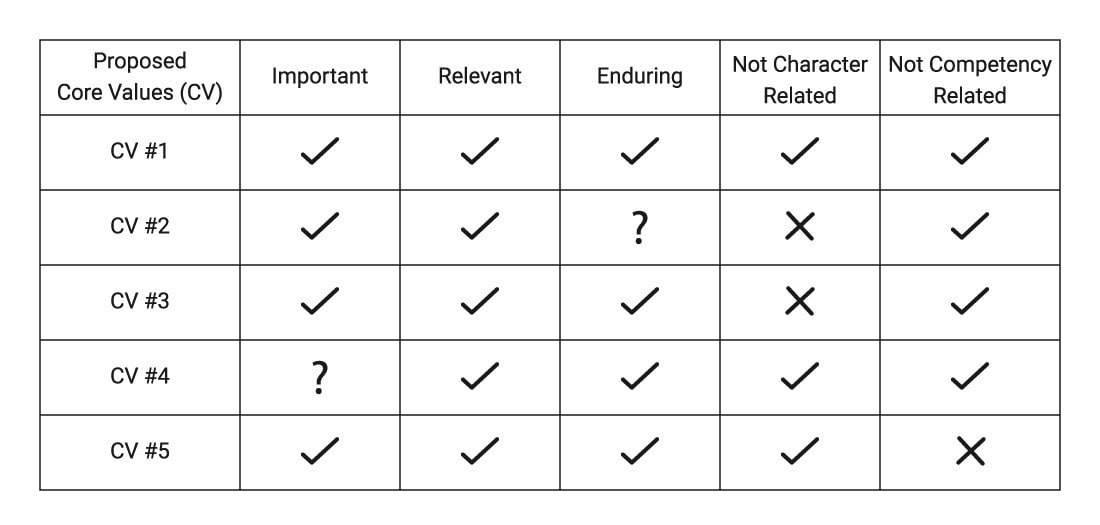At the core of every company is people. Everyone says this, so it reads trite, but anyone who has ever worked in a company knows this to be true. They also know that their level of life satisfaction, and their level of well-being, is fairly dependent upon their level of satisfaction with their work. Not only that, their satisfaction with work is significantly dependent upon their satisfaction with their relationships at work. In short, I believe High Trust Company’s (HTC’s) are those where the vast majority of employees genuinely love not just their Work but their Workplace (yep, another intentional capital W).
The other major item that comes into play for almost every worker is their belief that their work matters (aka they buy into the company’s purpose). Deep down inside I believe we all want to matter (and that to matter, we need to make life better). This is consistent with Maslow’s Hierarchy of Needs. If we matter, we will have a reasonable likelihood of developing self-esteem. I write “developing” because you cannot give it to someone. That was one of the big flaws with the self-esteem movement that began in the late 20th century. You have to earn self-esteem because then it’s yours. You earned it. You own it. You can take it with you if you want to move to another tribe (aka company). I like to say: to matter, you have to matter. By that I mean you can’t just want to matter, you have to earn it.
It’s like an insight I acquired decades ago which is:
You don’t make money because you want to make money; you make money because someone values what it is you do / have.
This simple idea applies to individuals and companies. At the risk of stating the obvious, all of this Work needs to be executed reasonably well if the company operates in a market where competition exists.
The consequence of all of this is that HTC’s have cultures that not only recognize the importance of people, and their need to matter, but minimize the inherent friction associated with all these different types of people (each of whom wants to matter) coming together and breaking apart to do Work. And one of the most important things HTC’s do is develop high trust cultures that are built upon a small collection of very well developed “Core Values.” Without a clear set of deeply shared values… there is no enduring connection).
HTC’s inevitably develop cultures that minimize the inherent friction associated with…different types of people coming together and breaking apart to do Work.
As I wrote about in “Being Human: 101,” thousands of years ago we developed values to make it easier for us to survive and flourish as social beings. The consequence of this is values are ubiquitous in all groups (religious or secular).
After a couple of decades or so of living on this planet, most of us have come to learn that there are all sorts of groups out there. Some we’re attracted to and comfortable within, and some we’d rather not be a member of. It feels almost wrong to write the last sentence, but it’s true. This doesn’t mean we cannot co-exist and thrive without belonging to all groups. And it certainly doesn’t mean that different groups cannot get along.
What it does mean is we are not well suited for all groups and, frankly, not all groups want us. Some groups need a certain level of Competency we don’t possess (e.g., an NBA team for >99.999% of humans) and some require a Character that we may not possess (e.g., a spy ring for me — I couldn’t lie well enough to save my life), and many are composed of values that don’t match well with ours (e.g., a dictatorship — I am not a big fan of being told what to do. You?).

This is my first essay where we’re going to take a deeper look at some of the more complex ingredients associated with the Three Dimensions of Trust. I’m starting these “deep dives” by unpacking the Core Values component of the Connections-Based Trust dimension (which I have come to believe could also be called the Social-Based Trust dimension but the “Three C’s of Trust” generally resonates better for me — feel free to comment). I’m starting with Core Values because it’s one of the most common ingredients that companies focus on if they have any interest in building an HTC.
So what are values?
According to Wikipedia: “In ethics, value denotes the degree of importance of some thing or action, with the aim of determining what actions are best to do or what way is best to live (normative ethics), or to describe the significance of different actions. Value systems are prospective and prescriptive beliefs: they affect ethical behavior of a person or are the basis of their intentional activities. Often primary values are strong and secondary values are suitable for changes. What makes an action valuable may in turn depend on the ethical values of the object it increases, decreases or alters. An object with “ethic value” may be termed an “ethic or philosophical good” (noun sense).”
I love this definition because there is so much to unpack here. Let’s list a few of the values of values:
- Some values are strongly held (e.g., what is good and important, tend to endure and are typically widely held by a group [e.g., democracy])
- Some values are more personal and subject to change (e.g., what is useful, beautiful, desirable and constructive)
- Most of us have values that reflect our personal beliefs on what “ought to be”
- Every value can be categorized along three sub dimensions:
– Importance (to me, to the group)
– Relevance (to me, to the group)
– Time (durability) - Since values help us understand the degree of importance, they are hierarchical in nature
- Since values are hierarchical, and we care more about things that deeply matter to us than those that don’t, they also help us form a hierarchy for feeling (from strongly for, to indifferent, to strongly against)
- Values have value and consequently can be thought of as a good (i.e., something whose value can be measured)
- The value of values can, with a bit of work, be measured and consequently values make it easier to objectively assess options so we can undertake cost / benefit analyses, make informed decisions and do what our team calls GSSD™ (“Get Smart Stuff Done™)
- Consequently, values help us form a hierarchy for thinking, feeling and doing (all three of which are needed to create and innovate) that not only simplify our choices but make it significantly easier for us to Work, and through our Work, make life better
What Core Values are Not
If you’ve been following this series, you may recall I purposely inserted the Core Values component into the Connections-Based Trust dimension and that, for purposes of clarity, I highly recommend you think of Core Values as traits that are not commonly associated with Character and Competency. I’ve worked with dozens of companies that mix these concepts and their Core Values are far more effective, and durable, when they don’t dilute them with Character-based traits (e.g., honesty, integrity) that are, in the words of Patrick Lincioni, “permission to play” or Competency-based traits that are not appropriate for every single seat in our company (e.g., detail oriented, innovative, organized).
Some Guiding Principles for Creating a Company’s Core Values
Core Values are a short list (typically 3 to 7) of behavioral norms, philosophical beliefs, and / or guiding principles that a company finds sacrosanct (aka important, relevant and enduring). The best Company Core Values score 10/10 across all three dimensions (recall, I love being able to understand the math associated with trust).
Well-defined and genuinely embraced Core Values:
- Clarify who we are
- Articulate what we stand for
- Guide us on who we hire
- Help explain why we do business the way we do
- Guide us on how to teach
- Inform us on how to reward
- Help us to better understand why some people don’t fit
- Help us let people go
- Unify the whole organization
- Inform our business processes
- Guide / are compatible with our value proposition
- Require no external justification
- Endure
There are numerous approaches to developing your company’s Core Values. If you haven’t already enumerated them or if you are not sure yours are right, here’s a brief summary of how I help my clients find theirs:
- I have them collectively create a list of 10–15 employees they love working with (the more that are known by most of those in the room, the better).
- I present the Three C’s of Trust framework and ask them to list the behavioral traits (repeat: not character, not competency) that they love about each one of these people.
- I write the words and short phrases (e.g., Get Stuff Done, Do the Right Thing) that they use to describe the traits that they love up on a white board.
- Once we’re done building the list of traits, I ask each of them to share the names of some colleagues (present and / or past) who they find / found really difficult to work with. My goal is to get 5–7 names and then have them share what behaviors / traits they find difficult to work with. Almost all the time, they tend to be the antithesis of some of the behaviors that they found so attractive in the colleagues that they loved working with.
- As they share their list of what I call “antitheticals,” we star the attractive / opposite behaviors.
- Finally, we work to consolidate the list into about five Core Values (90% of my clients have five).
- I know we’ve built Core Values that will last when the words we choose are words they were using all of the time. Words that they obviously use in the workplace. Words that are authentic, clear and easy to remember.
90% of the time, we get a very good initial list of Core Values within an hour, we load them into the Core Values section of Ninety.io (forgive the plug but it’s true), add some descriptors, and the teams find the exercise almost magical.
I then ask them to sleep on our Work and tweak as needed until they deeply love them. 90% of the time they are ready to publish / share their Core Values by the end of our second or third session together.
While I love all aspects of being a coach, helping teams nail their Core Values is probably not only one of the most rewarding things I do, but it’s probably the easiest Work I do.
If you’ve already built out your Core Values, are you and your colleagues confident they will stand the test of time?
Rock-solid values have three common “core” traits; they are important, relevant and enduring. It’s a worthy exercise to run each of your proposed values up against each of these. Is this value truly important to us as individuals and as an organization? Is this value relevant — does it matter as essential to who we are? And as time rolls on and we navigate future changes (some yet to be anticipated), will this value endure as we evolve?
Also, avoid diluting Core Values with words, concepts or traits related to Character or Competency. As referenced earlier, Character-Based Traits (e.g., “integrity”) are table stakes and add little value. Incorporating Competency-Based Traits (e.g. “innovative”) that typically don’t apply to every seat in the company will not stand the test of time if your using your Core Values to assess every person in your company and every candidate you consider hiring. What follows is a simple diagram you can use to assess your current Core Values if you already have them or to help you develop yours if you haven’t.

If the answers aren’t checked straight across the board, you may want to schedule an hour with your senior team and run through the exercise I shared earlier.
As Jim Collins and Jerry Porass masterfully presented in Built to Last (the book that unquestionably launched my career), enduring companies are founded, and later led, by individuals who not only provide their organizations with strong and well-defined philosophical belief systems but endeavor to ensure the systems persevere.
In short, genuine, well crafted, Core Values are one of the essential ingredients you’ll find in virtually every HTC. They help us distinguish between important and not important, desirable or not desirable. They help us find our kind of people and steer clear of the wrong people for us. They are tightly aligned set of lights that guide us toward and away from actions. They are one of the key ingredients associated with building and maintaining a High Trust Company.
Executive Summary
- A person’s well-being in general is influenced by the level of satisfaction with their Work, with their relationships within the workplace and the belief that their Work matters (aka they buy into the company’s purpose).
- You don’t make money because you want to make money; you make money because someone values what it is you do / have.
- An organization’s Core Values are a key component of the Connections-Based Trust dimension, one of the most common ingredients that companies focus on if they have any interest in building an HTC. This typically is a short list of behavioral norms, philosophical beliefs, and / or guiding principles that a company finds important, relevant and enduring.
- While there are different approaches to develop Core Values, well-defined and genuinely embraced Core Values will help clearly define who the company is, what it stands for, who belongs in it, who doesn’t, and make it much easier to not only attract but retain your kind of great people.
- Over the longer run, great Core Values accelerate our ability to build, and sustain, a High Trust Company.



